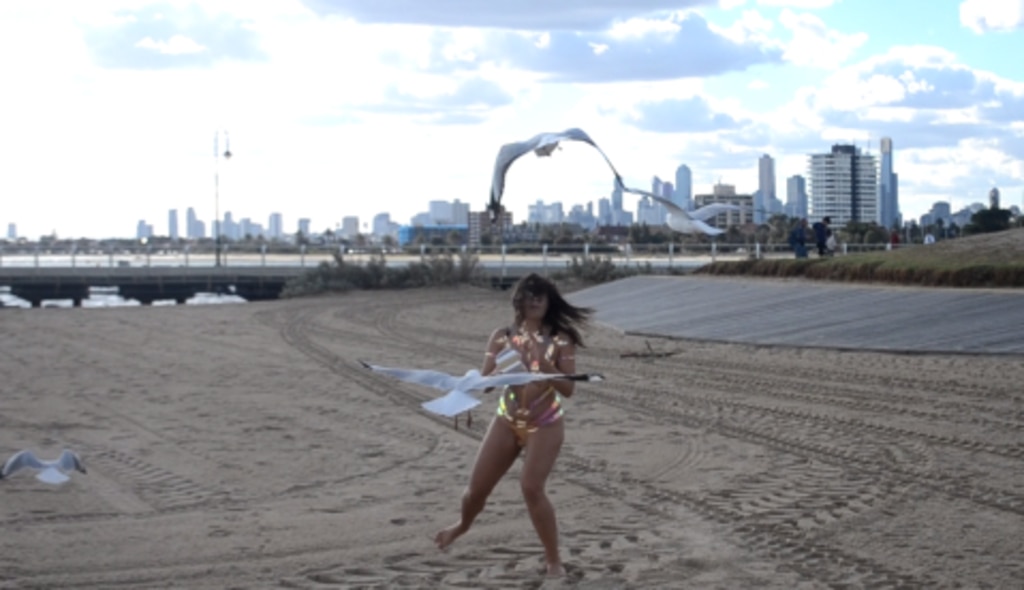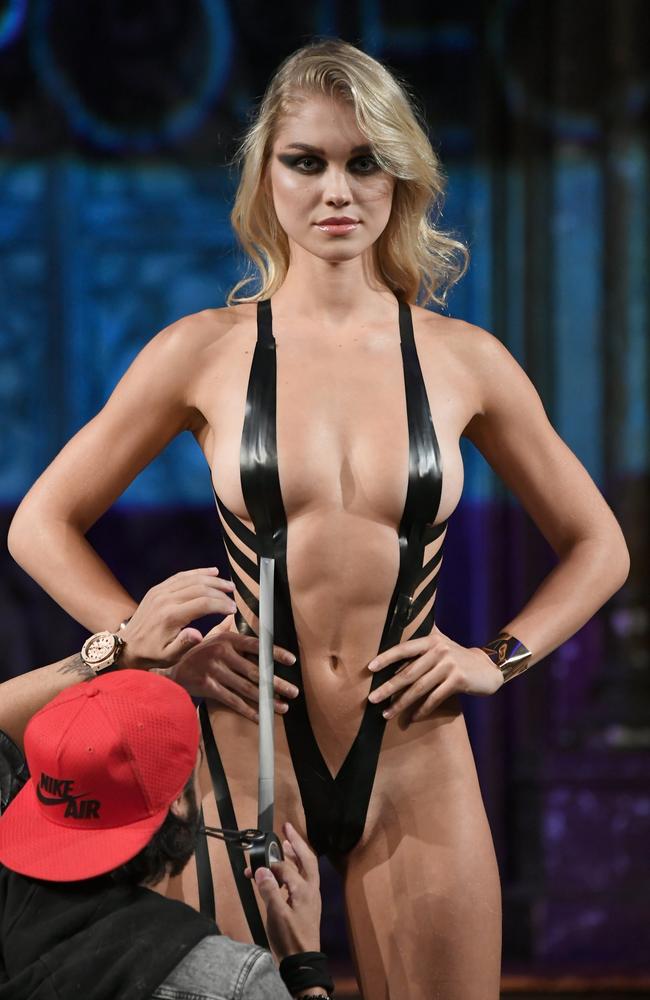Reality of duct tape bikinis when real women wear them
These shockingly skimpy “swimmers” have been splashed all over social media recently — but the reality of wearing them is far from glamorous.

Women wearing nothing but strategically placed metallic duct tape is the bizarre bikini trend that’s taken over Instagram recently.
The fearless look is the brainchild of Joel Alvarez, a designer from Miami, who owns an “artistic” venture called the Black Tape Project.
His striking black designs were the talk of New York Fashion Week last year but were given a glitzy makeover for the 2019 festival season, The Sun reports.

While models have been pictured dancing the night away in the seriously skimpy “bikinis” — can a normal girl really pull off the look?
Reporter Deni Kirkova, 28, taped up for a day out at St Kilda beach in Melbourne, using the iridescent blue “unicorn” and gold-coloured tape.

MELBOURNE COPS AN EYEFUL
Deni said: “It was an entertaining couple of hours in the ladies loos of a beachside café. Women kept walking in and gasping, while others didn’t know where to look.
“I thought it would be quick to apply, but you need to cut a lot of it up into small pieces.”
Once into her “bikini”, Deni took a few deep breaths and walked onto the beach where shocked sunbakers gawped as she made her way across the sand.
Some burst into giggles, yelling the tape outfit looked “sexy” and “fantastic” and one guy wolf-whistled.
But when the wind picked up speed, the “bikini” didn’t hold on.

Deni said: “It turns out that wearing this stuff while subjected to the forces of nature can spell disaster — you really need to know what you’re getting yourself into.
“A gust of wind whipped off some bits of tape, while the movement of my neck and torso meant the tape started to flap about freely.”
She tried desperately to stick it back on, but even with assistance it was tough.
ACHIEVING BASIC TASKS
Determined not to lose her composure and complete the real-girl challenge, Deni tried to participate in regular beach activities, like tucking into an ice cream and some hot chips.

At one point seagulls made a dive for her when they caught sight of her snack, and the outfit could barely hold it together as she ducked and dodged.
“Believe it or not, this outfit is not suitable for the beach. I had to run away from some birds and the tape just started to peel off,” Deni said.
“It’s no good in an emergency.
“You can’t swim or sweat without it falling off — and let’s not talk about the tan lines.”
Her reality was it was completely “impractical”, saying it wasn’t “sticky enough” for the needs of an everyday wardrobe item.

This wasn’t the only problems. Deni had to avoid the pina coladas for fear of needing the bathroom.
“Going to the toilet is basically a no-no,” she said. “You’d have to unstick the tape on your privates then try and reapply it.”
But she did admit to feeling “quite sexy” in her unusual outfit, despite its basic clothing fails.
NOT EVERYONE’S A FAN
The tape art movement is showing now sign of slowing down, with more than 86,000 followers flocking to the brand’s Instagram page to see images of nude women partially covered in tape designs.

Online commentators have pointed out there’s a dark side to this skimpy trend, warning the very revealing ensembles can be viewed as highly exploitative.
On Twitter, one user opined: “This is misogynistic degrading ‘so-called’ fashion! How can NY fashion week support this?”
Alvarez seems to only work with women with a very particular body type and never with blokes.
“No male example — shocker,” one online commentator wrote.
“The moment these trends stop being alternative methods of female objectification is the moment they’ll actually make sense.”
“Isn’t this just a ploy to have women at the beach practically naked for men to drool at?” another asked.
No matter what you think of his work, Alvarez is making bank with The Black Tape Project.
However, the reality of wearing his trendy design is brutal and impractical. We think we’ll pass.
This article originally appeared on The Sun and was reproduced with permission



